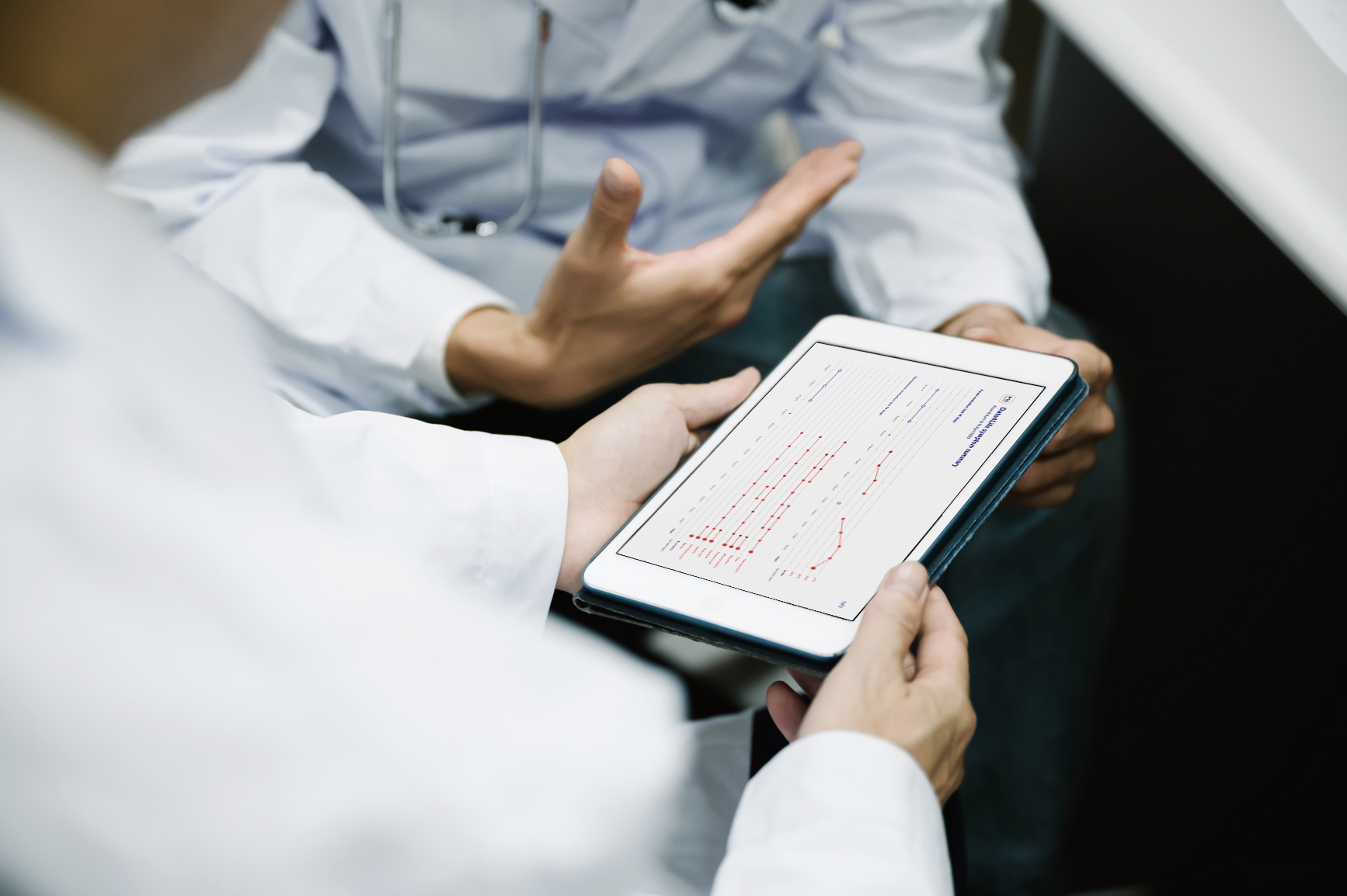Period irregularities: What is considered normal?
Whenever we notice changes in our bodies, we might wonder if something is wrong – and it’s the same for menstrual cycles. But just because something changes does not necessarily mean it’s a sign of illness. After all, there’s a wide range for what is considered "normal" when it comes to menstrual cycles [1]:
A menstrual cycle usually lasts between 25 and 31 days, which means there is a margin of 6 days. Changes in cycle length depend on the first half of the cycle when follicles mature. The menstrual period itself can also vary between 3 and 7 days. During this time, women usually lose from 60 to 120 milliliters of blood [2].
Any variations within this range are not necessarily indicators of a disease, but if you’re experiencing severe or unusual period pains, absence of menstruation, or more severe changes, these conditions may require attention [2].

If you notice any of these changes to your menstrual cycle, or you are generally unsure, it’s best to consult a gynecologist. Keep in mind there are many possible causes for irregular menstruation. And with the arrival of coronavirus vaccines, some women are raising concerns about a potential link between vaccines and menstrual changes. Only research can help us get some answers.
Current research on menstrual changes
At the beginning of 2021, an increasing number of women reported irregularities in their menstrual cycles after receiving coronavirus vaccines. The changes were only anecdotal and had no scientific basis at that time [3, 4].
The type of menstrual changes described also varied among those affected, with women reporting early, late, acyclic, heavy, absent, and more painful periods. In a British survey conducted by app, the number of women experiencing irregularities three months after vaccination was less than 0.1% of 657,000 app users. Clearly, these women represent exceptional cases [3-5].
Nonetheless, the question remains if these rare cases were merely a coincidence – menstrual irregularities are, after all, common – or if coronavirus vaccines do in fact cause menstrual changes.
Vaccines: cause vs. coincidence
When researchers study a relationship between two things, they generally distinguish between correlation and causation. Correlation is when two variables exist at the same time, but don’t necessarily have anything to do with each other [6].
A good example is orange imports from Portugal and the number of Germans residing in alcohol rehabilitation centers. Both have increased similarly over the past 70 years, but it’s clearly a coincidence, and one event doesn’t cause the other to happen [7].
It’s different for causation, which only applies if one event or action is the result of another. For example, it is now known that 83% of Germans who died from COVID-19 in 2020 died "because of" rather than just "with" COVID-19. The virus is the cause of death [8].
When it comes to the relationship between period disorders and COVID-19 vaccines, there are not yet enough studies to suggest causation. However, most experts doubt a causal relationship, and even if COVID-19 vaccines did cause menstrual changes, they would be harmless and temporary. Naturally this is in stark contrast to the risk of becoming severely ill with COVID-19 if unvaccinated [9-12].
Challenges for researchers
Although it’s unlikely that COVID-19 vaccines cause period irregularities, it’s still extremely important to better understand possible correlations – even if it’s only to inform people about vaccine safety and prevent women from worrying unnecessarily. Confidently stating that a side effect could occur, but would be harmless and temporary, would be reassuring in most cases [13].
However, even extensive clinical trials have their limits. Researchers can detect adverse events as rare as 1 in 1,000 people (or even 1 in 20,000). But for statistical reasons, rarer events can only be identified later on [14].
This is especially the case when the side effects in question are harmless and not reported as frequently by study participants. All serious period disorders were successfully ruled out in the clinical trials, but there’s always the possibility that minor or unusually rare menstrual changes were not detected [15].
Of course, there is always room for improvement in future clinical trials. For example, participants were asked about mild side effects such as headaches or arm soreness. Women with mild or minor menstrual abnormalities would have had to report these in the category "additional side effects." There were no targeted questions such as "Are your menstrual periods irregular?” or “Is your blood flow heavier than usual?" It would be easy to add such questions in the future [15].
In the case of COVID-19 vaccines, the tremendous urgency of the pandemic response should also be taken into consideration. The manufacturers had to develop effective and safe coronavirus vaccines as quickly as possible, and they did so successfully. None of the vaccines used in Europe had their approval withdrawn [15].
More data on the way
The good news is more detailed studies are on the way. For example, there is now evidence that immune cells play a role in the development and degradation of the endometrium. This makes an indirect influence of vaccines at least conceivable [15, 16].
In addition, an ongoing study in the USA has surveyed over 140,000 women who experienced period changes after being vaccinated for COVID-19. Here too, there are some reports of increased or unexpected menstrual bleeding. Postmenopausal women and women using long-acting contraceptives also reported bleeding [15].
More accurate findings are therefore on the way. Institutions such as the U.S. Centers for Disease Control and Prevention (CDC) and the Food and Drug Administration (FDA) are keeping an eye on the issue. However, even the most recent findings only emphasize the benefits of coronavirus vaccines and reinforce the recommendation to get vaccinated [15].
Other pandemic-related factors affecting menstrual cycles
Despite all efforts, it remains challenging to get clear results. Not only do periods vary from woman to woman and cycle to cycle, but also there are too many factors that can influence the duration, quantity, and consistency of bleeding [12, 16].
These factors include stress, illness, age, medications, diet, and exercise. Stress has been especially relevant since it played a unique role through the coronavirus pandemic [12, 16, 17].
In a recent study of 952 women, 273 study participants had period irregularities. All participants were also tested for depression, anxiety, and stress. On average, all three areas were more prevalent in the women with period irregularities. This is a clear indication of the influence of stress during the pandemic [18].
Other studies had similar findings and demonstrated the significant impact of the pandemic on various areas of female health. These included sleep, eating patterns, alcohol consumption, and general performance [19, 20]. The good news is the pandemic will someday come to an end. Until then, researchers have their work cut out for them.
It’s also important to recognize the tremendous steps we’ve already taken towards better understanding how COVID-19 impacts menstrual cycles. In contrast to vaccines, it has been clearly shown that the disease causes menstrual changes. About one in five women with COVID-19 experienced a decrease in menstrual volume or a lengthening of the menstrual cycle [21].
And yet it is worth taking action with the help of apps.
How digital solutions can help
Documenting menstrual cycles as accurately as possible is the best way to better understand them and external influences. It not only helps keep track of changes, but also makes it easier to share this information [9].
For example, women can give their gynecologists a more accurate picture of how their periods have changed over time. It’s also extremely helpful for researchers if all the details of a woman’s menstrual cycle have been recorded continuously [9, 22].
Physicians and specialists alike recommend the use of period-tracking apps. In previous app-based studies, researchers had an easier time determining which period variations are still within the range of normal [9, 23].
Regular period tracking could also mean major advances for vaccine clinical trials in the future. It’s a powerful tool for women, since it could potentially insure that "adverse event" data falls through the cracks [10].
Given the wide selection of period-tracking apps, women can choose the apps that best suit their personal needs.
The contents of this article reflect the current scientific status at the time of publication and were written to the best of our knowledge. Nevertheless, the article does not replace medical advice and diagnosis. If you have any questions, consult your general practitioner.
Originally published on







